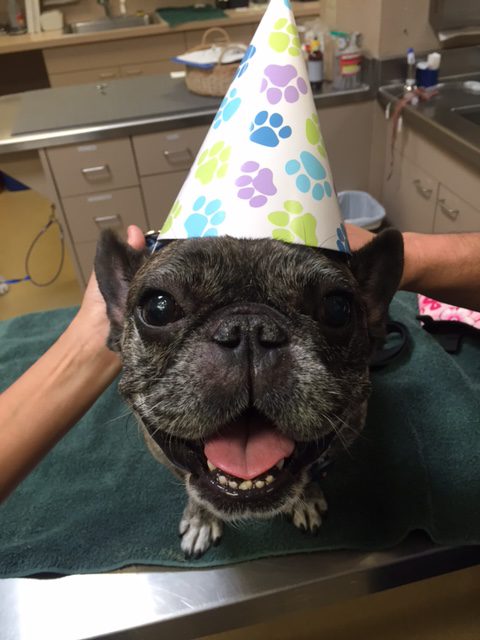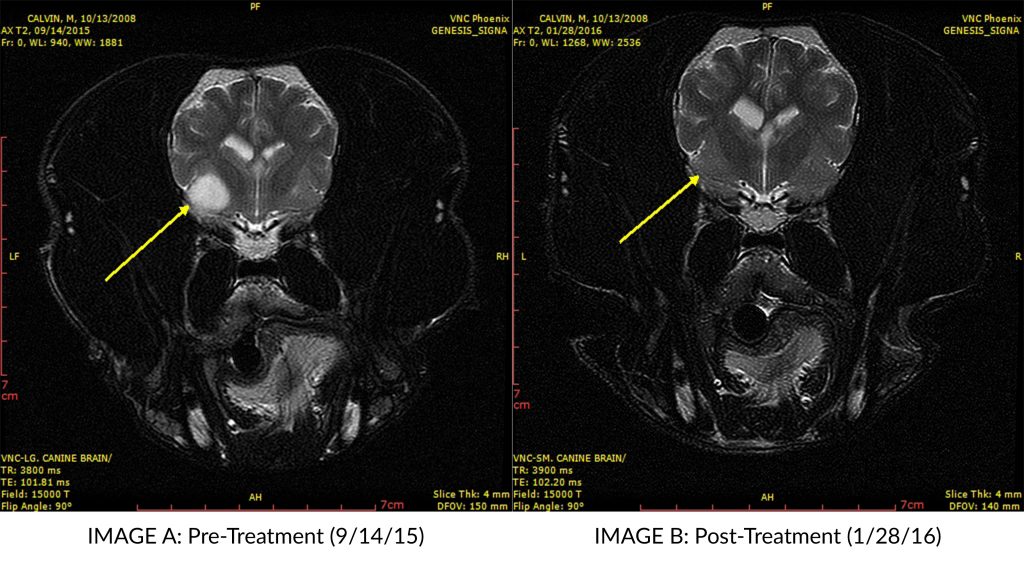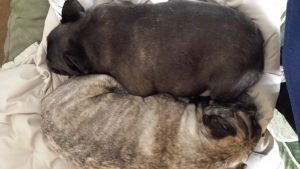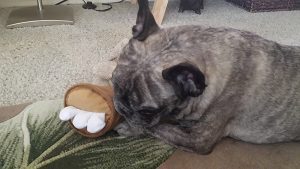Pet Hero: Calvin the Miracle Dog

May is Brain Cancer Awareness Month, and who better to represent this month than a brain cancer survivor like French Bulldog Calvin May? In the words of Calvin’s owner, Gretchen May, “[Calvin] might not be the smartest dog, but he’s full of cuddles and very sweet.”
Gretchen and David May’s other pet, a French Bulldog named Olive, was two years old when they decided she needed a baby brother. When they laid eyes on 4-month-old Calvin, his sweet demeanor and beautiful brindle coat sealed the deal. They drove to Oklahoma from Seattle, where the Mays were living at the time, to pick Calvin up, and he’s been their little baby ever since. According to the Mays, Olive is the cool diva and Calvin is the needy baby who craves attention. He loves to follow his big sister around and is a big love bug with people. He even likes going to the veterinarian’s office.
Calvin was 7-½ years old when his cancer journey started. It was a Sunday morning in late September 2015. Gretchen was getting ready to leave to teach her Pilates class when she noticed Calvin shaking under her husband’s desk. At first, she thought Calvin was choking. But he wasn’t choking – he was having a seizure, a common symptom of a brain tumor. When Calvin continued to have small seizures for an hour, the Mays rushed him to an animal emergency hospital, where he was put on medication and kept overnight.
The next morning, he was taken to his primary care veterinarian, Travis Nick, DVM, at Scottsdale Ranch Animal Hospital. Dr. Nick ran a few tests to see if Calvin’s seizures were caused by something outside of his cranial region. They weren’t. Calvin was then referred to a board-certified veterinary neurologist, Jason Evans, MS, DVM, DACVIM (Neurology), at Veterinary Neurological Center in Phoenix for further testing. A few hours later, the results of the MRI scan showed that Calvin had a brain tumor.
Gretchen recalls the moment they heard the cancer diagnosis. They had experienced a few tragedies that year, but nothing hit them harder than hearing Calvin had cancer.
“It was difficult and there were a lot of tears,” she said. “Olive and Calvin are our babies. I remember my husband telling Dr. Evans that we’d do anything necessary to help him.”
The Mays were not unfamiliar with pet cancer. In fact, Calvin’s sister, Olive, is also a cancer survivor. She was six years old when they found cancer in her front right toe. Her cancer was caught early and the malignant mass was removed. Now, they lovingly call her their “Three-Toe Bandito.” And while they were shaken by the news, the Mays weren’t about to give up on Calvin. If there’s one thing they’ve learned through Olive’s cancer experience, it’s that a cancer diagnosis is not a death sentence.
And, lucky for Calvin, his owners were prepared. Even before they received Calvin’s diagnosis, they were proactively researching new technologies to treat cancer in pets. Both Dr. Nick and Dr. Evans had told the Mays about a new technology called stereotactic radiosurgery (SRS), a radiation therapy treatment proven successful in human medicine that is now available to treat cancer in pets. They said if Calvin’s MRI scans revealed a brain tumor, SRS might be a good option for him. So when the cancer was confirmed, they were prepared to schedule a consultation with board-certified radiation oncologist Eric Boshoven, DVM, DACVR (Radiation Oncology) of PetCure Oncology at Arizona Veterinary Oncology in Gilbert, Arizona.
Dr. Boshoven recommended SRS as the best treatment for Calvin based on the location of the brain tumor. For the Mays, it was an easy decision. Conventional radiation therapy would have required 15 sessions of treatment under general anesthesia. With SRS, he would only need three sessions. That’s less time in the hospital, less risk during treatment, and, most importantly to the Mays, less stress for Calvin.
Calvin received SRS treatment in October and was put on medication to reduce swelling in his brain. Besides a slight lightening of his coat, he did not experience any side effects from the radiation treatments. His medication, on the other hand, made him very hungry. The Mays humorously recalled that they probably all gained weight that month.
The holidays passed uneventfully, and the 4-month post-treatment MRI scan showed that Calvin’s tumor decreased in size so much that it was nearly gone.

Calvin has since visited his primary care veterinarian and neurologist for routine exams, and both were amazed at how well he’s doing. Dr. Evans remarked that, based on Calvin’s behavior, no one would be able to tell he had a brain tumor just a few months earlier.
“He’s our little miracle dog,” said Gretchen. “We feel incredibly lucky that we had access to SRS here in Arizona.”
Calvin is back to playing with his favorite toy – an old soft plush doll called his “crunchy bone.” He’s full of energy and loves to fling “crunchy bone” and zoom around the house. The Mays say that radiation therapy treatment hasn’t changed Calvin’s personality. He’s still as sweet as ever, asking for cuddles and trailing after big sister, Olive.

Calvin snuggling with big sister, Olive

Calvin playing with a new toy
Learn more information about brain tumors in dogs and cats.
The following articles are solely for educational purposes and not meant to diagnose your pet. Always consult with your pet’s primary care veterinarian if you see unusual behavior in your pet.
- PetMD, Brain Tumors in Dogs
- Healthy Pets with Dr. Karen Becker, Brain Tumors
- Canine Cancer, Brain Cancer
- NC State Veterinary Hospital, Brain Tumors in Dogs and Cats
- UC Davis Veterinary Medicine
